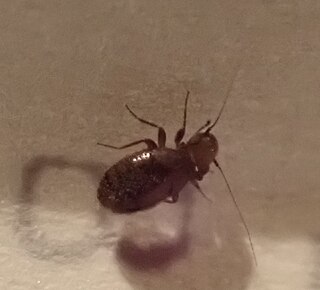
Prunus laurocerasus, also known as cherry laurel, common laurel and sometimes English laurel in North America, is an evergreen species of cherry (Prunus), native to regions bordering the Black Sea in southwestern Asia and southeastern Europe, from Albania and Bulgaria east through Turkey to the Caucasus Mountains and northern Iran.

The Connecticut College Arboretum is a 300 ha arboretum and botanical gardens, founded in 1931, and located on the campus of Connecticut College and in the towns of New London and Waterford, Connecticut, United States.

Psocoptera are a paraphyletic group of insects that are commonly known as booklice, barklice or barkflies. The name Psocoptera has been replaced with Psocodea in recent literature, with the inclusion of the former order Phthiraptera into Psocodea.

Psocodea is a taxonomic group of insects comprising the bark lice, book lice and parasitic lice. It was formerly considered a superorder, but is now generally considered by entomologists as an order. Despite the greatly differing appearance of parasitic lice (Phthiraptera), they are believed to have evolved from within the former order Psocoptera, which contained the bark lice and book lice, now found to be paraphyletic. They are often regarded as the most primitive of the hemipteroids. Psocodea contains around 11,000 species, divided among four suborders and more than 70 families. They range in size from 1–10 millimetres (0.04–0.4 in) in length.

Ditula angustiorana, the red-barred tortrix, is a moth of the family Tortricidae found in Africa, Asia, Europe and North Africa. Other common names are the fruit-tree tortrix and the vine tortrix. The moth was first described by Adrian Hardy Haworth in 1811.

Paraneoptera or Acercaria is a superorder of insects which includes lice, thrips, and hemipterans, the true bugs. It also includes the extinct order Permopsocida, known from fossils dating from the Early Permian to the mid-Cretaceous.
Amphigerontia bifasciata is a yellowish-black coloured species of Psocoptera from Psocidae family that can be found in Great Britain and Ireland. They can also be found in Austria, Belgium, Croatia, Denmark, Finland, France, Germany, Hungary, Italy, Latvia, Luxembourg, Norway, Poland, Romania, Sweden, Switzerland, and the Netherlands.
Ectopsocus axillaris is a species of Psocoptera from the Ectopsocidae family that can be found in Great Britain and Ireland. The species are brownish-black coloured and is similar to Bertkauia lucifuga.

Ectopsocus briggsi is a species of Psocoptera from the Ectopsocidae family that can be found in Great Britain and Ireland. The species are brownish-orange coloured.

Elipsocus hyalinus is a species of Psocoptera from the Elipsocidae family that can be found in Great Britain and Ireland. They are also common in countries like Austria, Belgium, Cyprus, Denmark, Finland, France, Germany, Greece, Hungary, Italy, Poland, Portugal, Romania, Spain, Sweden, Switzerland, and the Netherlands. The species are yellowish-black coloured.
Elipsocus pumilis is a species of Psocoptera from the Elipsocidae family that can be found in Great Britain and Ireland. They also live in countries like Austria, Benelux, Bulgaria, France, Germany, Greece, Hungary, Italy, Latvia, Poland, Romania, Spain, Switzerland, and Scandinavia. The species are black coloured.
Enderleinella obsoleta is a species of Psocoptera from Stenopsocidae family that can be found in Great Britain and Ireland. The species are brown coloured.

Lepinotus patruelis is a brown coloured species of Psocoptera from the Stenopsocidae family that can be found in Great Britain, Ireland, and Scotland. Besides the Britain I., it can also be found in Austria, Benelux, Finland, France, Germany, Italy, Switzerland and Scandinavia.
Peripsocus didymus is a species of Psocoptera from the Peripsocidae family that can be found in Great Britain and Ireland. It can also be found in Austria, Belgium, Finland, France, Germany, Hungary, Italy, Luxembourg, Norway, Poland, Romania, Spain, Sweden, Switzerland, and the Netherlands. The species are brown coloured.
Peripsocus subfasciatus is a species of Psocoptera from the Peripsocidae family that can be found in Great Britain and Ireland. The species are either black or brown coloured.

Valenzuela flavidus is a species of Psocoptera from Caeciliusidae family that can be found in the United Kingdom, and sometimes Ireland. They are also common in Austria, Azores, Belgium, Bulgaria, Canary Islands, Croatia, Denmark, Finland, France, Germany, Greece, Hungary, Italy, Latvia, Luxembourg, Norway, Poland, Portugal, Romania, Spain, Sweden, Switzerland, and the Netherlands. It is also widespread in Near East. The species are yellowish-black coloured.

Valencia burmeisteri is a species of Psocoptera from the family Caeciliusidae that can be found in United Kingdom, and sometimes Ireland. They are also common in Austria, Belgium, Bulgaria, Canary Islands, Croatia, Denmark, Finland, France, Germany, Greece, Hungary, Italy, Latvia, Luxembourg, Madeira, Norway, Poland, Portugal, Romania, Spain, Sweden, Switzerland, and the Netherlands. It is also widespread in Near East. The species are yellowish-black coloured.

Mihrabat Nature Park is a nature park located on the Asian part in Beykoz district of Istanbul Province, Turkey.
Ectopsocus meridionalis is a species of outer barklouse in the family Ectopsocidae. It is found in Africa, the Caribbean, Europe and Northern Asia, Central America, North America, Oceania, South America, and Southern Asia.












